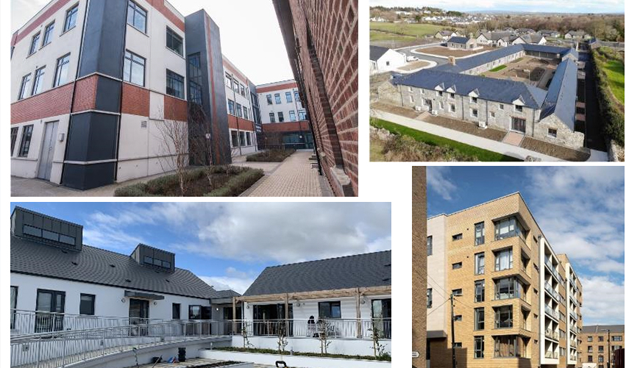
2022: A defining year for housing
4th July 2022
A growing AHB sector offering wider housing options in local authority action plans
4th July 2022Housing First: The European Platform on Combatting Homelessness

Credit: Oleg Shatrov
Director of Social Affairs in the European Commission’s Directorate-General for Employment, Social Affairs and Inclusion Katarina Ivanković Knežević, discusses the role of the new European Platform on Combatting Homelessness.
Knežević points to the launch of the European Platform to Combat Homelessness, through the signing of a declaration in Lisbon in June 2021 as the beginning of concrete work at European level and evidence of the “vision and determination” to support European citizens who find themselves homeless.
Signed by all 27 member states, the declaration established the platform, which is seeking to build a common understanding, at European level, of tackling homelessness, with a view to ending homelessness in the EU by 2030.
“By signing the declaration, all stakeholders have committed to first of all renew their efforts in fighting homelessness by reinforcing the prevention of homelessness and implementing housing-led approaches which seek to end homelessness and not simply manage it,” Knežević explains.
Working under the umbrella of the platform, signatories pledged to deliver actions within their respective competences, under the objectives of:
• no one sleeps rough for lack of accessible, safe and appropriate emergency accommodation;
• no one lives in emergency or transitional accommodation longer than is required for successful move-on to a permanent housing solution;
• no one is discharged from any institution (e.g., prison, hospital, care facility) without an offer of appropriate housing;
• evictions should be prevented whenever possible and no one is evicted without assistance for an appropriate housing solution, when needed; and
• no one is discriminated against due to their homelessness status.
In February 2022, national ministers, representatives of the EU institutions and bodies, as well as civil society and social partners endorsed the work programme of the platform.
Explaining the Commission’s role, Knežević says: “The EU will not only support member states but also local authorities and different stakeholders in combatting homelessness by allocating funding, developing the policy guidance and by sharing the good practices that have been shown to successfully support people experiencing homelessness.”
The Director of Social Affairs says that this will be supported by the collection of national data and statistics on homelessness and what she deems “the most important and impactful” aspect of the platform, support for member states to prepare integrated and holistic national housing strategies.”
Stressing a consensus that a Housing First approach is the best way forward in tackling homelessness, Knežević believes that full eradication is possible by the provision of additional services to support those most vulnerable.
Describing the “complex” causes of homelessness and efforts to tackle them, the Director of Social Affairs says that many are directly linked to not only European but global rising housing costs and of insufficient supply of social housing stock or of housing assistance. To this end, she says that the platform is carrying out a deep-dive review of the common challenge across all member states.
Knežević points to work for the platform and for member states in addressing additional issues such as that of low income and precarious work which has led to around 10 per cent of Europeans currently spending 40 per cent of their monthly income on housing, meaning more people are being pushed towards the poverty threshold.
Additional challenges include the impact of discrimination, family breakdown, long-term health problems or, something which Knežević says the EU are particularly focusing on, insufficiently prepared releases from institutional settings.
She adds: “Moreover, the Covid-19 pandemic placed additional pressure on people at risk of becoming homeless and especially people who were homeless at a time when the pandemic hit. I believe that the good practices that they have seen throughout by member states have shown that this issue is solvable and maybe this was an additional push for us to really start working hard on addressing homelessness.”
Work by the platform is based in the European Pillar of Social Rights and its subsequent action plan, principle 19 of which states: “People in need should be given access to good quality social housing or housing assistance. Vulnerable people have the right to adequate assistance and protection against forced eviction. Homeless people should be provided with adequate accommodation and services in order to promote their social inclusion.”
“It is up to us the policymakers to put that into practice and have it reflected in adequate housing in terms of security of tenure, affordability, and habitability, but also accessibility and location when it comes to an individual person.
“The pillar also promotes the reintegration of homeless people into society by means of enabling social service and that brings us back to the importance of delivering housing in parallel with those additional services.”
Social housing
The Director of Social Affairs says that social housing is one of the key ingredients in any integrated strategy to combat homelessness. Explaining her understanding of social housing as the broader concept of either public, municipal, or subsidised housing of any form, she says that efficient supply of social and affordable housing is a known preventative of homelessness.
Commissioner for Jobs and Social Rights, Nicolas Schmit recently stated that ‘housing cannot be left to the market’ and Knežević says that with this in mind, she believes there is a need for a renewal of public investment in social and affordable housing throughout the EU from both national and EU budgets.
Pointing to existing programmes, such as the European Social Fund (ESF+), with an estimated spend of €100 billion between 2021 to 2027, the EU’s main financing instrument for investment in this area; financing for social and affordable housing projects which may be mobilised within the framework of the European Regional Development programme; and the InvestEU, through its social investment and skills window; as well as within the framework of the National Recovery and Resilience Plans financed through the Next Generation EU Programme, Knežević points to a “favourable context” for investments in decent and affordable housing, including the resources and instruments being mobilised for recovery and energy efficiency within the “renovation wave”.
Concluding, she says that ambitions to eradicate homelessness in Europe by 2030 will not be the work or the Commission, Parliament, or Council alone and will require the collaboration of all 27 members states, their social partners and civil society stakeholders.
“There are no easy solutions or shortcuts. It took our Finnish colleagues 10 years to really see the benefits of the housing first approach, but it is important that we start with a clear vision because if we try to tackle the issue in isolation, we will find ourselves on different paths.”







